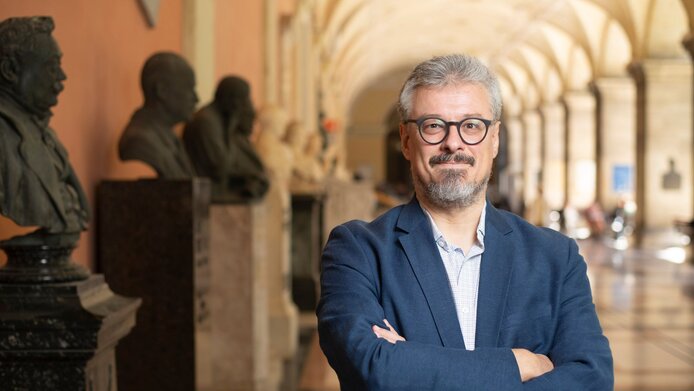The astonishing career of less prominent early Christian figures

You study texts that are associated with important early Christian figures. Can you briefly outline your field of research?
Dan Batovici: We are all familiar with the apostles, the twelve disciples who followed Jesus. An enormous number of texts connected with them have survived outside the biblical canon, these texts are known as apocryphal literature. Behind the important figures of the apostles, however, there is another group of early Christian figures. While secondary, they are still closely associated with the New Testament narrative in one way or another – mostly because they had a connection to the apostles. These figures are part of a second generation of Christians and the first to speak of “Christianity.” They include Ignatius of Antioch, Clement of Rome, but also Thekla of Iconium, who is said to have been a student of the Apostle Paul. Texts have been written about these secondary figures – or in their name – over the course of twelve centuries. These writings are the subject of my project.
How are you studying this text corpus?
Batovici: So far, these texts have only been studied in the context of individual collections. For the first time, I am looking at these writings and their development over the centuries as an independent whole. Most of them were written in Greek, but were later translated into many other ancient languages. I have chosen three of these languages: Coptic, Syriac, and Armenian. I am studying the writings across the different languages as a network and trying to recognize developments that have so far remained hidden.
Personal details
Dan Batovici studied classical philology in Bucharest and theology and religious studies in Cambridge and St. Andrews. He works as a research assistant at the Faculty of Theology and Religious Studies at KU Leuven, where he also completed his doctorate in 2015. In the past, Batovici, whose research focuses on early Christian writings, was a visiting scholar at the University of Cambridge and Wolfson College in Oxford. He is currently a visiting researcher at the University of Vienna. He will be carrying out his START project at the Austrian Academy of Sciences.
What specific questions would you like to answer?
Batovici: I am trying to understand how such a productive literary tradition could be established around these minor figures, comparable to that of the apostles. At the same time, I would like to find out why some of these figures were able to become so highly significant within local traditions. For example, some writings attributed to Clement of Rome were included in the manuscript of the New Testament in the Syriac Middle Ages. The two letters of Clement were incorporated into the liturgy of the Western Syriac region in the 12th century. He is accorded a similarly high level of authority as the apostles, although he actually ranks far behind them in the early Christian hierarchy. These developments do not exist in any other traditions or language areas. I would like to answer how such phenomena could come about in the history of the reception of these secondary early Christian figures.
What will your first steps be?
Batovici: I will be setting up my research group and starting work as soon as possible. I run an online research seminar for manuscript studies with colleagues. This means that we already have access to a large network of young researchers in this field. When I was writing the project proposal, I already had certain candidates in mind to include in the group.
What will the START Award mean for your research activities?
Batovici: The biggest change is that I will now be leading a team for the first time. This creates a new dynamic that will have a decisive influence on my career and make it more stable.
About the project
The “Generative Authority” project examines the complex reception of literature related to well-known secondary early Christian figures. In various late antique and medieval manuscript cultures, they are sometimes accorded very different meanings. The project is the first to investigate the “generative authority” of these figures in a set of Greek, Coptic, Armenian, and Syriac manuscripts.
Your research requires you to spend a great deal of time studying texts. How do you stay motivated?
Batovici: You might think that in my work, the interesting discoveries, the ones that get published, are few and far between. But the truth is, I collect data that is important to me every day. At some point, all these accumulated findings will be systematized in a publication. But the really interesting thing is the day-to-day work, which allows me to delve deeper into the world of these manuscripts step by step.
The FWF START Award
The START program of the Austrian Science Fund (FWF) is aimed at outstanding young researchers, giving them the opportunity to plan their research in the long term and with a high degree of financial security. It is endowed with up to €1.2 million and is one of Austria’s most prestigious and most highly endowed awards alongside the FWF Wittgenstein Award.





